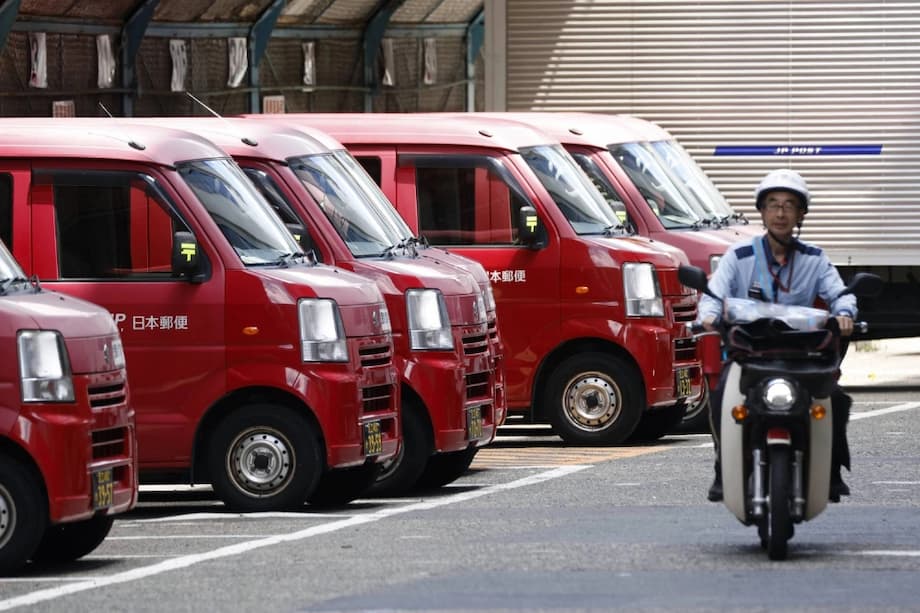A widening crackdown on driver checks at Japan Post
Japan’s transport ministry has ordered Japan Post to suspend the use of some light commercial vans at about 100 post offices after investigators found widespread failures in legally required driver roll calls, including missing or falsified alcohol checks. The order expands a compliance crisis that already cost the company its truck transport business license in June, a penalty that sidelined roughly 2,500 trucks for five years. The new action targets the vans that carry the bulk of everyday parcels and mail, raising fresh questions about delivery capacity and safety oversight inside one of the country’s most important logistics networks.
- A widening crackdown on driver checks at Japan Post
- How roll calls work and why they matter
- From trucks to vans, the enforcement expands
- What the suspension could mean for deliveries
- Motorbikes and the oversight gap
- International headwinds add pressure
- What regulators want to see from Japan Post
- The Bottom Line
Roll calls are a routine but mandatory process in Japan’s transport sector. Operation managers must check drivers for sobriety and general health before they start work and again when they return. They also confirm rest time, evaluate fatigue, review routes, and ensure vehicles are fit for the road. Japan Post’s own internal probe found the practice was not consistently followed. In April, the company reported that more than 70 percent of 3,188 branches surveyed failed to conduct proper roll calls. Investigators also found improper roll calls for motorbikes at 1,834 branches, about 60 percent of those reviewed.
Japan Post said the latest measures’ impact on daily service remains unclear, but the company pledged to continue deliveries on its usual schedule and scale. The suspension length will vary by branch, tied to the number of vehicles involved and the seriousness of violations uncovered. The ministry continues to audit additional sites, so restrictions will be phased in and could eventually affect about 2,000 post offices nationwide. The company operates about 32,000 light commercial vehicles across Japan. In this context, even limited van suspensions can pinch capacity where branches already lost access to trucks after June.
How roll calls work and why they matter
Roll calls sit at the core of Japan’s road safety framework for cargo operators. Under the Trucking Business Law, companies must assign trained operation managers who verify a driver’s physical condition and sobriety before the shift begins and after it ends. These checks are meant to catch issues that raise accident risk, from alcohol use to fatigue and illness. Managers also review vehicle condition and documentation. Failures in this process are treated as serious, since one lapse can have outsize consequences on busy roads.
What a legal roll call requires
A typical roll call requires a face to face interaction with an operation manager. The manager confirms the driver’s identity, checks for alcohol with calibrated devices, and asks about sleep, medication, and any health symptoms that could impair driving. The manager confirms records, including vehicle inspection notes, and logs the results. Many operators deploy networked alcohol detectors and digital systems to store time stamped results and prevent shortcuts. Regulators expect these records to be complete and easy to audit.
Authorities have alleged both omissions and falsification at some Japan Post sites. In June, the ministry summarized audit findings that showed persistent failures at branches using trucks, vans and other general cargo vehicles. The agency stated that the violations included alcohol checks that were not conducted and cases where paperwork was made to look complete when checks did not actually happen.
The transport ministry said statutory roll calls were conducted improperly or even falsified at many sites, including cases where drivers were not subjected to alcohol tests or where mandatory inspections were only recorded on paper.
Such findings draw maximum scrutiny because they point to process breakdowns rather than isolated mistakes. When the manager level control weakens, the risk of repeat violations grows, which is why regulators often insist on structural fixes, retraining, and more frequent audits.
From trucks to vans, the enforcement expands
The June license revocation for Japan Post’s general cargo truck operations was a first for a major nationwide carrier. That decision barred the company from using roughly 2,500 trucks for five years and forced a pivot to outsourcing and other transport modes. Light vans, many of them small kei class vehicles, are often treated separately and are critical for last mile routes. The new disciplinary notice focuses on those vans at a set of branches where investigators completed their reviews and found ongoing roll call violations. The ministry signaled that the rollout will continue branch by branch as audits wrap up.
Japan Post acknowledged the gravity of the case in an earlier statement, calling the violations a threat to the company’s standing and pledging corrective action.
Japan Post said it recognizes this is an extremely serious violation of the law and considers it a serious matter that could affect its very existence.
Officials have indicated that penalty points in at least one region far exceeded the threshold that triggers strong sanctions. Unlike the truck license revocation, which was nationwide and categorical, the new van suspensions are targeted and time limited. The period will depend on the number of vehicles at each branch and the severity of lapses. That approach gives the ministry a way to increase pressure while allowing sites that fix their controls to return vehicles to service.
What the suspension could mean for deliveries
Vans are the backbone of Japan Post’s parcel and mail network. They move between local post offices and neighborhoods, carry volume during peak shopping periods, and reach areas where larger trucks are inefficient. Parking even a portion of a branch’s vans introduces friction, since those routes must be absorbed by remaining vehicles, contracted carriers, or shifted to different time windows. The company insists it will maintain scheduled deliveries, suggesting a mix of rescheduling, temporary outsourcing, and route adjustments.
Japan Post has long relied on a blend of its own assets and partners for transport. With 2,500 trucks off the road after June, line haul and regional transfers already lean more on outside carriers. The new constraints on some vans will test the flexibility of local operations. Customers may not notice immediate changes if the suspensions are short and localized, although thinly staffed rural offices have less slack than large urban centers. If audits expand and vehicle suspensions touch a larger share of branches, pressure could rise in the weeks ahead of holiday and year end mail surges.
There is also the question of cost. Outsourcing last mile work is usually more expensive than rolling it into the existing fleet. If Japan Post pushes more volume to contractors, that can preserve service reliability but add expense. The firm has stated that it is examining the administrative orders and will decide on concrete measures while keeping customer impact in view.
Motorbikes and the oversight gap
Japan Post’s internal review found improper roll calls for motorbike deliveries at 1,834 branches. Those bikes play a key role on narrow streets, for time sensitive mail, and on routes where parking space is scarce. Oversight for two wheelers often falls under different rules than trucks and vans, so the transport ministry is not directly handling those investigations. Other ministries and regulators could get involved depending on jurisdiction. In practice, the same safety principles apply. Drivers must be fit for duty, and managers must document checks that the law requires.
If remedial steps focus only on trucks and vans, the risk of inconsistent safety culture remains. Expect Japan Post to extend any retraining, record keeping upgrades, and compliance audits to bike operations, even if different authorities ultimately enforce the rules.
International headwinds add pressure
While Japan Post navigates domestic enforcement, it is also adapting to a major shift in international small parcel rules for the United States. In late August, Japan Post temporarily suspended acceptance of certain goods shipments to the U.S. after Washington ended the de minimis duty free window for low value imports. The U.S. had allowed goods valued under 800 dollars to enter without duties and with minimal customs processing. That policy supported cross border e commerce by reducing fees and paperwork, and it helped fuel a jump to about 1.36 billion de minimis parcels in 2024. The new rules require duties or flat fees to be paid and set new data and deposit requirements for carriers, leaving many postal operators without sufficient clarity to continue business as usual.
Japan Post’s move mirrored actions by postal services across Europe and Asia, which paused many U.S. bound parcels while they retool systems. Letters, documents, and gifts under 100 dollars continue, and Japan Post directs customers with urgent parcels to its international courier option, UGX, which complies with U.S. customs procedures but at higher prices. A six month transition period offers a path to resume some traffic under a flat duty per package, but the extra steps still require new software links, payment workflows, and training.
Japan’s economy minister, Ryosei Akazawa, tried to reassure customers that alternatives exist even as the new U.S. rules disrupt small parcel flows.
Akazawa said the impact on users would be limited because there are other shipping methods that remain available.
What regulators want to see from Japan Post
Enforcement actions like license suspensions are meant to trigger lasting reforms. In practice, regulators expect several shifts inside a company of Japan Post’s size. First, responsibility must be clear at every branch. Operation managers need authority and resources to carry out checks without shortcuts. Second, tools must support compliance. That can include centrally managed alcohol testers that store results automatically, time stamps for roll calls, and software that flags gaps. Third, accountability must be consistent. Where falsification occurred, corrective steps include discipline, retraining, and more frequent surprise audits.
Auditors will also look for a measurable reduction in risk. That can show up in early morning and late night shifts, when fatigue is common, and in routes with heavy traffic density. A branch that proves it has reliable controls in place will have a stronger case to lift van suspensions sooner. The ministry has said suspension periods will be tailored to each site’s vehicle count and the severity of violations. With audits still under way, further notices are likely before the situation stabilizes. Customers should expect the company to prioritize essential mail and medical deliveries if capacity tightens.
The Bottom Line
- Japan’s transport ministry ordered Japan Post to suspend some vans at about 100 post offices after roll call failures, including missing alcohol checks.
- The move follows a June decision that revoked Japan Post’s truck transport license for five years, sidelining about 2,500 trucks.
- Japan Post says it will keep normal delivery schedules while it evaluates the orders and adjusts operations.
- Internal audits found over 70 percent of 3,188 branches failed to conduct proper roll calls, pointing to company wide compliance gaps.
- Improper roll calls for motorbikes were found at 1,834 branches, which may draw action from regulators beyond the transport ministry.
- Van suspension lengths will vary by branch and the severity of violations. Further audits could expand the number of affected sites toward 2,000.
- Japan Post operates about 32,000 light commercial vehicles, making targeted van suspensions a meaningful constraint in some local areas.
- International parcel flows are also under strain as Japan Post, like many peers, limits some U.S. bound shipments after the end of the de minimis duty free rule.
- Regulators will look for durable fixes, including stronger manager oversight, digital alcohol testing records, and consistent accountability for violations.












